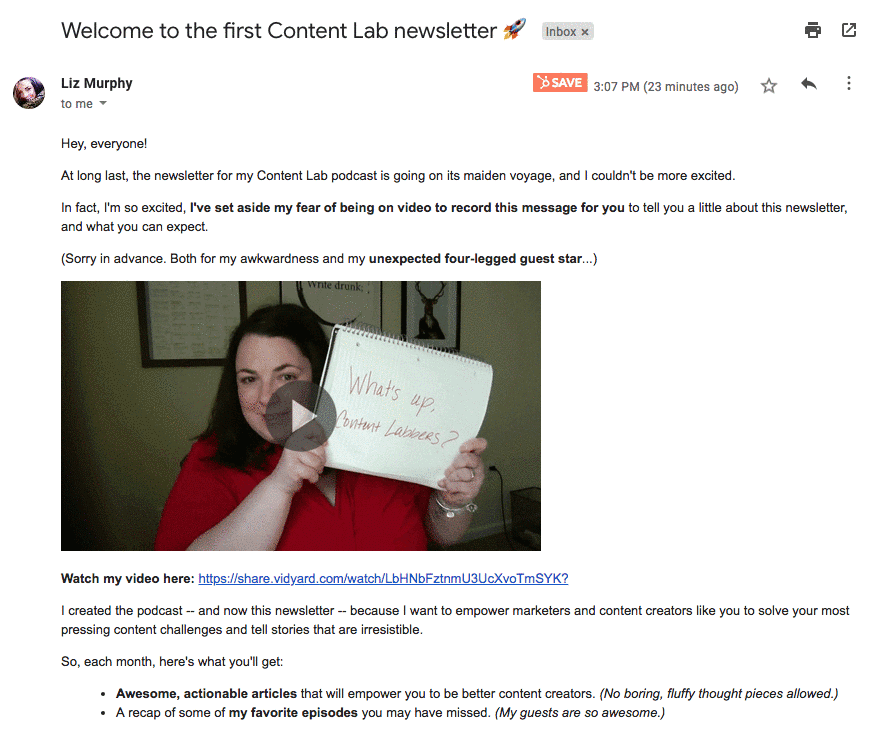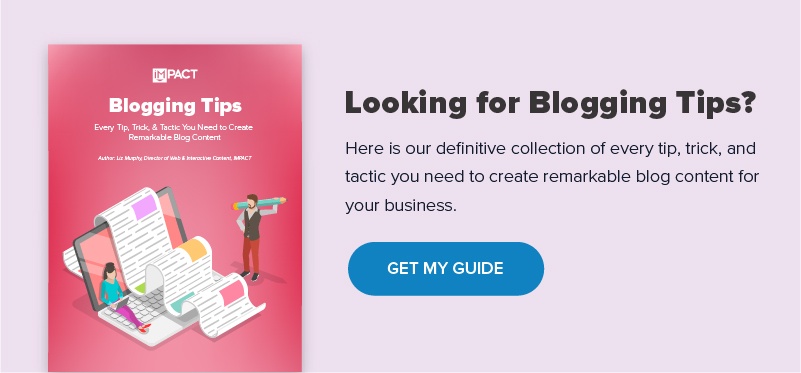Topics:
Content MarketingSubscribe now and get the latest podcast releases delivered straight to your inbox.
Hey, everybody! 👋
It's just me this week, because I'm back with a second installment of a new monthly Content Lab episode feature called the “What’s on My (Content) Mind,” which will star little ol' me, on my own.
As I told you all in January, I've been tinkering with the format of Content Lab to make it more valuable and productive for you.
Before, I was trying to shoehorn in all of my thoughts and ideas around interviews and conversations that really should have been allowed to stand on their own.
Now, each month, I'm going to take a break from chatting with others to share with you all what’s inspiring me, any major content milestones from the past month, and what I’m going to be focusing on in the month to come.
That way, we all still get to learn from some of the brightest content minds in the industry, and I still get to talk to you, one-on-one, about all of the new tools, strategies, and ideas we're testing here, as well as what's inspiring me and challenging me.
But the goal of Content Lab hasn't changed -- to arm you with “the strategies and tools you need to create the addictive content your audience will love.”
OK, let’s do this.
Enjoy!
Listen to the Episode
What's Inspiring Me
You need to read Long Story Short: The Only Storytelling Guide You'll Ever Need by Margot Leitman.
I'm reading it in advance of going to Speak with Confidence, a four-day keynote speaker training retreat in Fort Collins, Colorado, which is put on by Melanie Spring.
(You may remember her from episode six of the Content Lab, during which she and I had a super fun chat about how to become a brand storytelling rockstar.)
Major Content Milestone
Read my new Blogging Tips guide:
What I'm Thinking About
Unfortunately, much like last month’s installment of my little chat with you, I still can’t let the cat out of the bag on what I’m working on.
What I can say, however is that -- as part of this “top secret” work -- I’ve spent a lot of time in the past month or two really diving into every nook and cranny of Marcus Sheridan’s They Ask, You Answer.
I know a lot of people in the inbound and content marketing world have read this book — I also read it when it first came out a few years back -- but if you haven’t, you need to order this, in addition to Long Story Short.
They Ask, You Answer is a mindset and culture wherein companies embrace an obsession understanding what their customers are truly thinking, feeling, asking, and fearing.
The end goal is, once you have that deep understanding of what your customers are seeking/wondering/fearing, you can then position yourself as the foremost teacher in your space.
I spend a lot of time talking to you all about being helpful in your content -- whether we’re talking about blog articles, long-form premium content, webinars, talks, and so on.
What helpful content looks like, how to actually create it, etc.
But there is one core element of being super helpful that I don’t talk about nearly enough, and I realized it as I re-read They Ask, You Answer.
In it, Marcus reminds us that buyers -- our own and ourselves when we’re off the clock -- want to understand the good, the bad, and the ugly of what they’re getting into.
But, too often, we avoid addressing those big scary questions and topics, because they make us uncomfortable.
We don’t want to talk about uncomfortable things like price or problems in our content, right? Because those answers might be a turnoff or give our competitors a leg up. Or maybe we’re just afraid we’ll piss someone off.
But just because we decide we’re not going to answer a question for someone in our content doesn’t mean the question goes away.
Just like if I decide I don’t want to talk about how much my trip to Trader Joe’s this afternoon is going to cost with my husband, doesn’t change the fact that he’s going to ask the question.
And if I don’t answer or address it, it’s going to create a problem.
The same holds true for our audiences.
So, this afternoon, I’m going to make a list of all the uncomfortable questions I haven’t been in addressing in the content I create. The good, the bad, and the ugly -- especially the ugly.
Then, I’m going to prioritize the most uncomfortable questions first and make a calendar for creating content that answers those questions.
That’s what I’m working on this month, at least in a broad sense, and I challenge you all to do the same.
Come up with at least 10 questions you know your buyers are asking -- about problems with your products and services, about your competitors, about pricing, whatever.
Now, ask yourself, this: “Why do I not want to write about these topics?"
If the answer to that question is solely focused around your discomfort or your fears -- which your buyers do not also share -- then take that as a signal that you absolutely 100 percent need to be creating content (videos, blog articles, etc.) that answers those questions as thoroughly and honestly as possible.
Your lack of comfort is not an acceptable excuse for not talk about something. It just makes you seem more evasive and less trustworthy of a resource.
Let's go back to the inevitable discussion I’m going to have in about an hour with Patrick about Trader Joe’s.
If he were to ask me about how much I were going to spend, and I were to pivot the discussion by saying I wasn’t sure how much I was going to spend (a lie), but let’s talk about how many different things I can do with the triple brie cheese I’m picking up this afternoon -- which I know is his favorite -- I would sound like a politician trying to dodge a question.
“Yes, Liz, cheese is wonderful, but quantify that cheese for me -- how many dollars and cents will that cheese cost us?”
Your buyers will do the same -- they’re going to keep asking those questions online until someone gives them an answer in content form.
And if someone else does it who isn’t you, how likely is it that your would-be buyer is going to trust them more than you? Because your competitor gave it to them straight, without obfuscation? Because your competitor addressed the concerns and questions that were actually important to them and not just what you decided you wanted to talk about?
Very likely.
These are your opportunities to lose.
Subscribe to the Content Lab Monthly Newsletter
Once a month, I'm going to send you an absurdly useful newsletter will tons of insights, tips, and tools for you to make your content amazing. It's that simple.
Here's what it looks like, so you know what shenanigans you're getting into with me:

So, what are you waiting for? Go to this page and sign-up.
Connect with Content Lab
Okay, first, you've gotta subscribe to Content Lab on Apple Podcasts. That way you'll never miss an episode!
Or you can comment on this episode below! I'd love to hear from you.


Order Your Copy of Marcus Sheridan's New Book — Endless Customers!


